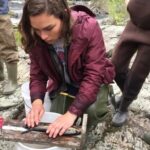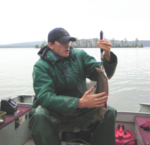Fisheries Minor
Fisheries Opportunities at the University of Maine | Careers in Fisheries | Curriculum
Students not currently in the Wildlife Ecology program but who are interested in fish ecology or management and pursuing a career as a fisheries biologist can complete a minor in Fisheries. Students can meet course certification requirements for a professional fisheries biologist with one additional course in the sciences. The fisheries minor is offered by the College of Earth, Life, and Health Sciences and is built on the expertise of three units in the college: Department of Wildlife, Fisheries, and Conservation Biology; School of Biology and Ecology; and School of Marine Sciences.
Fisheries Opportunities at the University of Maine

The University of Maine (UMaine) is a teaching and research university with outstanding opportunities for freshwater and marine fisheries education. There are few places with Maine’s combination of 6,000 lakes and ponds, 32,000 miles of rivers and streams, and 3,500 miles of coastline. With one of the sharpest climatic gradients in the United States, Maine has outstanding cold water and warm water fisheries along with some of the most productive marine fisheries and aquaculture in North America.
Maine’s diverse aquatic environment is both an outdoor teaching laboratory and a rich source of opportunities for student internships and professional job experience. Professionals from the myriad of state and federal agencies, public groups, and industry involved in fisheries, the aquatic environment, and recreation in Maine bring their experience to the classroom and seminars. There are more than 80 faculty at the university who teach in the area of ecology and environmental science with many courses relevant to fisheries biology and management.
 In addition to classroom and research facilities on the Orono campus, the University maintains several research and teaching facilities throughout the state, as well as a fleet of watercraft. Leading the list are the Ira C. Darling Marine Center, a modern research and teaching facility with research vessels and flowing seawater facilities, and the Franklin Fish Hatchery with its growing capacity for marine and freshwater fish culture. In addition, students are encouraged to obtain hands-on involvement in active research conducted by University researchers and cooperating management agencies.
In addition to classroom and research facilities on the Orono campus, the University maintains several research and teaching facilities throughout the state, as well as a fleet of watercraft. Leading the list are the Ira C. Darling Marine Center, a modern research and teaching facility with research vessels and flowing seawater facilities, and the Franklin Fish Hatchery with its growing capacity for marine and freshwater fish culture. In addition, students are encouraged to obtain hands-on involvement in active research conducted by University researchers and cooperating management agencies.
Careers in Fisheries
The American Fisheries Society (AFS) defines a fisheries professional as an individual with specialized education in the sciences and technologies involving the structure, dynamics, and interactions of habitat, aquatic organisms, and humans. Therefore, career opportunities are varied, including science-oriented careers focused on understanding fish and aquatic ecology, managing fish resources for public agencies, and fish production and utilization for sale by private industry. Some potential fisheries careers include research support for field or laboratory studies, hatchery or aquaculture production, and management or conservation of aquatic resources. Examples of agencies, organizations, or businesses in Maine that employ fishery biologists or aquatic ecologists include the Maine Department of Inland Fisheries and Wildlife, the Maine Department of Marine Resources, the Maine Atlantic Salmon Commission, the Department of Environmental Protection, National Marine Fisheries Service, the University of Maine, aquaculture industry, power companies, and environmental consulting firms.
For more information about obtaining a fisheries minor, please contact:
Dr. William Ellis, Associate Professor of Oceanography and Associate Director
360 Aubert Hall
207-581-4360
william.ellis@maine.edu
Curriculum
- WLE 200 – Ecology Credits: 3
- or
- BIO 319 – General Ecology Credits: 3
- or
- SMS 300 – Marine Ecology Credits: 3
- Required:
- WLE 410 – Wildlife Population Dynamics and Conservation Credits: 3
SMS 321 or WLE 340 is required plus one additional course from the following list:
- SMS 211 – Introduction to Aquaculture Credits: 3
- SMS 230 – Introduction to Marine Policy and Fisheries Management Credits: 3
- SMS 321 – Introduction to Fisheries Science Credits: 3
- SMS 422 – Biology of Fishes Credits: 3
- WLE 340 – Freshwater Fisheries Ecology and Management Credits: 3
One of the following courses:
- BIO 468 – Lake Ecology Credits: 3
- SMS 302 – Oceanography Credits: 3
One of the following courses:
- STS 132 – Principles of Statistical Inference Credits: 3
- WLE 220 – Introduction to Ecological Statistics Credits: 4
One of the following courses:
- ECO 377 – Environmental Economics and Policy Credits: 3
- SMS 230 – Introduction to Marine Policy and Fisheries Management Credits: 3
- WLE 470 – Wildlife Policy and Administration Credits: 3
Minimum course prerequisites for the fisheries minor are BIO 100, BIO 200 (or SMS 201 & 203), MAT 111, and ECO 100 or ECO 120. Some combinations of courses in the minor also will require CHY 121/123, CHY 122/124, PHY 112, and SMS 100 as prerequisites.
